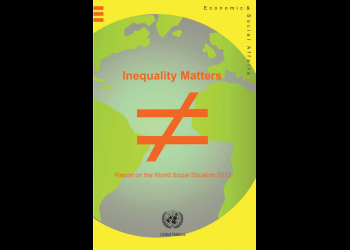New UN report examines inequalities in the world social situation
Inequalities of wealth, whether at the national or international level, are largely the result of social, economic, and political policies – and they can therefore be undone through policy measures, according to a new report from the United Nations.
“The experience of some countries shows that growing inequality is neither destiny nor a necessary price to pay for economic growth. Policy makes a difference,” according to the report, “Inequality Matters: Report of the World Social Situation 2013.”
Released 14 February 2014 by the UN Department of Economic and Social Affairs (DESA), the report also concluded that economic growth does not necessarily imply an increase in disparities between the rich and the poor within a given country.
“Much can be learned from countries that have been able to reduce inequalities despite the uncertain global economic outlook,” according to the report. “Indeed, the experience of some countries shows that growing inequality is neither destiny nor a necessary price to pay for economic growth.”
The report discusses policies that can be changed to help eliminate inequality. These included emphasizing “universal, good quality” public spending for health, nutrition, sanitation and education, and “urgent action” to establish a “basic social protection floor” providing access to basic services for all.
The report’s launch at the UN Headquarters building included remarks by Thomas Gass, Assistant Secretary-General in DESA, and a presentation by Wenyan Yang, who lead the DESA team that authored the report.
It also featured a panel discussion by Sarah Cook of the UN Research Institute for Social Development, Kwabia Boateng of the Economic Commission for Africa, and Ming Hwee Chong of the Baha’i International Community. The discussion was moderated by Daniela Bas, director of the Division for Social Policy and Development of DESA.
In opening remarks, Mr. Gass stressed the importance of addressing income inequalities worldwide, calling them a very “toxic issue” that carry the moral imperative of finding a solution.
In her presentation of the report, Ms. Yang noted that while economic inequalities across countries have somewhat declined in recent decades, they have risen within many countries as the wealthiest individuals have become wealthier while the relative situation of people living in poverty has improved little.
It was noted that the mean income of a resident of Albania or the Russian Federation is lower than that of an individual in the lowest 10 per cent of the income distribution in Sweden, who also earns 200 times more than an individual in the bottom decile in the Democratic Republic of Congo.
Ms. Cook said in the world’s efforts to “optimize for economic efficiency,” a number of social problems and inequities have been created. Governments then seek to solve those problems. A better system would seek to optimize policy for social justice from the start, she said.
“We need to figure out the vision of the society that we want, and then determine the policies that achieve those objectives,” she said.
Mr. Boateng said inequalities in Africa were caused largely by colonialism and other ideologies that have made a lasting impact. He said Africans today need to come up with their own plans and goals to address inequalities.
Mr. Chong agreed with Ms. Cook that it is the overall vision for the kind of society we want that should drive policies to address inequality.
In that context, he said, development should be seen as a global enterprise concerned with how humanity advances together as a whole.
“It’s not about the advancement of any one group of people, or community, rich or poor, urban or rural,” said Mr. Chong, who is a representative of the Baha’i International Community to the United Nations.
“Whether directly or indirectly, we are affected by the progress or struggles of nations and communities outside our own,” said Mr. Chong. “So in a case when nations or parts of the world advance at the expense of others; or even just in the absence of another, can we still call that development?”
To read the full “Inequality Matters” report, click here.
